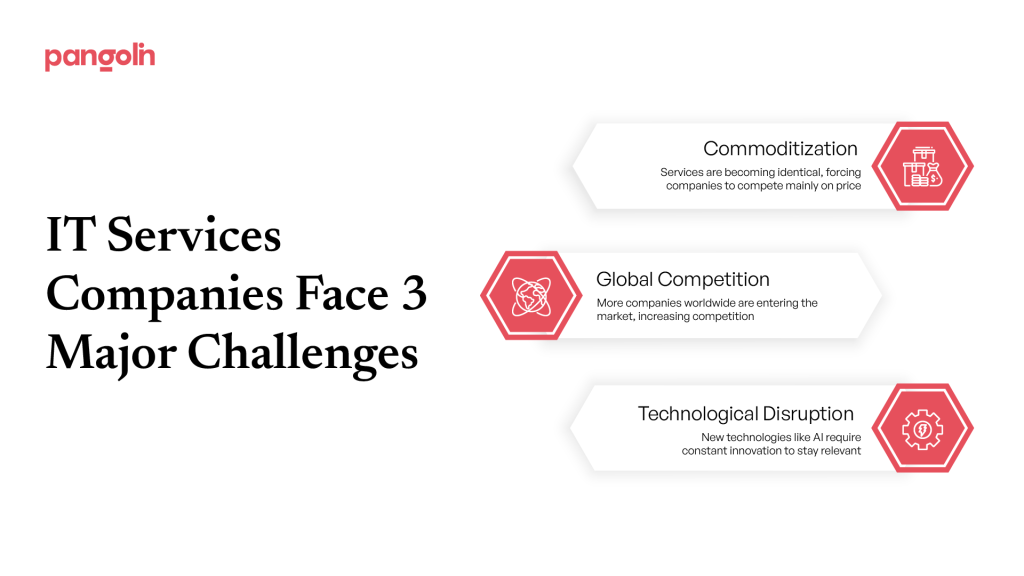Imagine walking into a vast supermarket where every aisle offers the exact same brand of cereal. The boxes look identical, the prices are nearly the same, and there’s little to distinguish one brand from another.
At first glance, it might seem convenient, but soon, the lack of variety leads to fierce price wars, shrinking margins, and dwindling customer loyalty.
This scenario isn’t just a hypothetical—it mirrors the reality many IT services companies face today.
Recent reports show that marketing budgets have dropped from an average of 9.1% of company revenue in 2023 to 7.7% in 2024, a fall of 15% year over year.
Why? Because the industry is teetering on the brink of an existential crisis.
Three major challenges are driving this turmoil: commoditization of services, intense global competition, and relentless technological disruption.
Are your strategies strong enough to break free from the price war trap? If not, your IT services company might be at risk.
This blog delves into these critical challenges and reveals how adopting full-funnel marketing can be the key to not just surviving, but thriving in this cutthroat environment.
Ready to differentiate your company and boost profitability?
What is Commoditization in IT Services?
The Supermarket Shelf Analogy
Continuing with our supermarket analogy, commoditization in IT services occurs when every IT services company offers nearly identical solutions.
Just as every cereal box looks the same, commoditized IT services lack distinct features or unique value propositions. This uniformity makes it hard for companies to stand out in a crowded market.
Defining Commoditization in IT Services
Commoditization happens when IT services become so similar that clients view them as interchangeable.
In this environment, different IT services companies struggle to highlight their unique strengths or specialized expertise.
Instead of differentiating based on innovation or quality, companies find themselves competing primarily on price.
Breaking Down the Analogy
To better understand commoditization, let’s break down our supermarket analogy:
Identical Products: Just as every cereal box looks the same, commoditized IT services lack distinct features or unique value propositions. This uniformity makes it hard for companies to stand out in a crowded market.
Price Wars: In a supermarket, if one brand lowers its price, others quickly follow to stay competitive. Similarly, IT services companies often engage in price wars to attract clients, leading to reduced profit margins. Lowering prices becomes the main strategy to win business, rather than showcasing superior quality or innovative solutions.
Lack of Loyalty: Customers in the supermarket switch brands based on minor price differences. In the IT services sector, clients may switch companies for marginal cost savings, undermining long-term relationships and loyalty. This transient client base makes it difficult for companies to build sustained growth and trust.
Impact of Interchangeable Services
When IT services lose their uniqueness, several negative consequences emerge:
Reduced Differentiation: Without distinct offerings, IT services companies struggle to stand out. Clients view all companies as providing the same services, making it difficult to justify higher prices or choose based on quality.
Price Wars: Companies lower their prices to remain competitive, which leads to:
- Diminished Margins: Lower prices mean smaller profit margins, making it challenging to invest in quality services or innovative solutions.
- Financial Strain: Reduced margins can limit a company’s ability to scale operations, hire top talent, or adopt new technologies.
Struggle to Maintain Client Loyalty: When services are seen as interchangeable, clients are more likely to switch companies based on cost rather than loyalty or satisfaction. This leads to:
- High Client Turnover: Frequent client changes can disrupt revenue streams and hinder long-term growth.
- Reputation Damage: Constantly competing on price can erode a company’s reputation for quality and expertise.
Is your company facing similar challenges? If commoditization is affecting your margins and client loyalty, it’s time to rethink your strategy.
How to Combat Commoditization
To stand out in a commoditized market, consider these strategies:
- Differentiate Your Services: Highlight what makes your IT services company unique. Whether it’s specialized expertise or innovative approaches, make sure clients see the value beyond price.
- Focus on Quality: Invest in delivering exceptional services. High-quality B2B marketing services can justify higher prices and build client loyalty.
- Build Strong Relationships: Foster long-term partnerships with clients. Understanding their needs and delivering consistent results can set your company apart.
Technological Disruption
You have a tireless assistant who never sleeps, effortlessly handling repetitive tasks while you focus on strategic initiatives. This assistant is Artificial Intelligence (AI) and automation in the IT services landscape.
These technologies are not just tools—they are revolutionizing how IT services companies operate and deliver outstanding results.
From automating mundane processes to providing deep data insights, AI and automation are essential for modern IT digital marketing.
They enable companies to streamline operations, enhance precision, and unlock new levels of efficiency.
How is your company leveraging AI and automation to stay ahead? If not, you might be missing out on opportunities to optimize your services and outperform competitors.
Challenges of Rapid Technology Adoption
Embracing AI and automation comes with its own set of hurdles for IT services companies:
- Keeping Up with Speed: Technology evolves at lightning speed. IT services companies often struggle to integrate new tools into their existing workflows, leading to delays and operational inefficiencies.
- Skills Gap: Implementing advanced technologies requires specialized skills. Many companies face a shortage of trained professionals who can effectively utilize AI and automation tools. Continuous training is essential but can be costly and time-consuming.
Opportunities Created by AI and Automation
Despite the challenges, AI and automation open up a world of opportunities:
- Enhanced Services: AI enables content marketing for tech companies to create highly personalized campaigns. Automation streamlines processes, allowing companies to focus on strategy and creativity, resulting in better client outcomes and higher satisfaction.
- Efficiency and Scalability: Automation tools can manage large volumes of data and execute multiple campaigns simultaneously. This increases efficiency and allows B2B SEO services to scale without compromising quality. Companies can serve more clients and achieve superior results with the same resources.
Real-World Success: InnovateTech’s Transformation
Consider InnovateTech, a leading tech marketing agency.
Faced with declining margins and rising competition, InnovateTech integrated AI-powered analytics to gain deeper insights into client data. This enhancement improved their IT lead generation services, allowing them to target high-value prospects with precision.
Additionally, InnovateTech adopted marketing automation platforms to streamline campaign management. This move not only reduced operational costs but also boosted campaign performance, resulting in a 40% increase in lead conversion rates.
By investing in technology and upskilling their team, InnovateTech turned challenges into opportunities, setting a benchmark for other marketing agencies for tech companies.

A Crowded Playing Field: The Global IT Services Market
The surge of startups and international firms is a game-changer for IT services companies.
These new players bring fresh perspectives, innovative strategies, and often more competitive pricing.
Unlike traditional companies, many of these entrants leverage cutting-edge technologies and agile methodologies to deliver superior IT lead generation services and B2B SEO services.
This influx of talent and innovation puts significant pressure on established IT services companies to evolve or risk being overshadowed.
Impact on Established Firms
As startups and international competitors gain traction, established IT services companies face several challenges:
- Reduced Market Share: With more options available, clients have the luxury to choose companies that offer the best value, often leading to a decline in the market share of long-standing firms.
- Pricing Pressure: Increased competition drives prices down. Established companies, which may have higher operational costs, find it difficult to compete solely on price without compromising their profit margins.
- Innovation Demands: To stay relevant, established firms must continuously innovate. This requires substantial investment in new technologies and training, which can strain resources.
Consequences of Intensified Competition
The ripple effects of heightened global competition are profound:
Margin Erosion:
- As IT services companies engage in price wars, profit margins shrink.
- Lower margins limit the ability to reinvest in advanced IT digital marketing tools and talent acquisition.
Client Retention Challenges:
- Clients may switch companies for marginal cost savings, leading to higher churn rates.
- Building and maintaining long-term client relationships becomes more difficult when clients prioritize cost over quality.
Operational Strain:
- Increased competition demands higher efficiency and productivity.
- Companies may struggle to balance cost-cutting measures with the need to deliver high-quality services.
Strategies to Stay Competitive
To thrive amidst global competition, IT services companies should consider the following strategies:
- Embrace Innovation: Invest in the latest IT digital marketing technologies and stay ahead of industry trends.
- Differentiate Services: Highlight your unique strengths and specialized expertise to stand out from competitors.
- Enhance Client Relationships: Focus on building strong, long-term partnerships through exceptional service and personalized solutions.
- Optimize Pricing Strategies: Develop flexible pricing models that offer value without sacrificing quality.
The Urgency for Change
The IT services industry is at a critical juncture. IT services companies are grappling with three major challenges: commoditization, global competition, and technological disruption.
These issues are not isolated—they intersect to create a perfect storm that threatens the very existence of many firms.

Failing to address these challenges can have severe consequences:
- Continued Margin Erosion: As IT services companies compete on price due to commoditization, profit margins continue to shrink. This financial strain limits your ability to invest in innovative IT digital marketing tools and top-tier talent.
- Potential Business Failure: Without adapting to technological advancements and countering global competition, your company risks losing market share. This loss can lead to decreased revenue and, ultimately, business failure.
- Client Attrition: In a highly competitive environment, clients have numerous options. Companies that do not differentiate their B2B marketing services risk losing clients to more agile and innovative competitors.
Time to Reflect and Act
It’s essential to evaluate your readiness to adapt and implement effective solutions. Embracing full-funnel marketing can provide the strategic edge needed to navigate these turbulent times.
How prepared is your team to leverage new technologies and innovative marketing strategies? Assessing your company’s strengths and areas for improvement is the first step toward sustainable growth and resilience.
The window for strategic intervention is closing. IT services companies must act now to implement solutions that address commoditization, harness technological advancements, and outpace global competitors.
Don’t wait until it’s too late. Start transforming your B2B IT marketing strategies today to secure your company’s future and thrive amidst the challenges.
Is Full-Funnel Marketing a Solution?
Full-funnel marketing transforms how IT services companies engage with their clients by meticulously addressing every phase of the customer journey—from initial awareness to long-term retention.
Unlike traditional marketing methods that merely focus on lead generation, full-funnel marketing ensures that every prospect is nurtured, guided, and ultimately converted into a loyal customer.
For IT services companies, this comprehensive strategy involves seamlessly blending top-of-the-funnel (TOFU) tactics like content marketing for tech companies with bottom-of-the-funnel (BOFU) approaches such as personalized lead generation for tech companies.
This integration not only attracts potential clients but also builds meaningful relationships that drive sustained growth and profitability.
Benefits of Full-Funnel Marketing for IT Services
- Combating Commoditization: By delivering personalized and value-driven campaigns, IT services companies can differentiate their services. This approach reduces reliance on price wars and enhances client loyalty.
- Leveraging Technological Advancements: Full-funnel strategies incorporate AI and automation to optimize each stage of the funnel. This not only improves efficiency but also allows IT services companies to offer innovative solutions that keep pace with technological changes.
- Mitigating Global Competition: A well-executed full-funnel strategy ensures consistent engagement with prospects and clients worldwide. This global reach helps IT services companies maintain a competitive edge by tapping into diverse markets and expanding their client base.
Implementing Full-Funnel Marketing Strategies
- Awareness: Utilize content marketing for tech companies to create informative and engaging content that attracts potential clients.
- Consideration: Implement targeted lead generation for tech companies to nurture prospects through personalized email campaigns and informative webinars.
- Conversion: Use advanced B2B SEO services and IT lead generation services to convert engaged prospects into paying clients.
- Retention: Foster long-term relationships with existing clients through continuous engagement and value-added services, ensuring sustained growth.
Looking Ahead
Full-funnel marketing is not just a trend; it’s a strategic necessity for IT services companies aiming to thrive in a challenging environment.
By embracing this holistic approach, your IT digital marketing efforts can overcome industry challenges and drive meaningful growth.
Recapping the Crisis and the Solution (H2)
The IT services industry is facing unprecedented challenges. IT services companies are battling commoditization, grappling with rapid technological disruptions, and contending with fierce global competition.
These issues are not just obstacles—they threaten the very foundation of many firms, leading to declining margins and client attrition.
However, there is a way forward.
Full-funnel marketing emerges as a strategic solution that addresses these pressing challenges head-on.
By encompassing every stage of the customer journey—from awareness to retention—full-funnel marketing empowers IT services companies to differentiate their services, leverage cutting-edge technologies, and maintain a competitive edge in the global marketplace.
Take Action Today
The time to act is now. The risks of inaction—continued margin erosion, potential business failure, and dwindling client loyalty—are too significant to ignore. IT services companies must embrace full-funnel marketing to navigate these turbulent times and secure a prosperous future.
Are you ready to transform your company and overcome industry challenges? Let Pangolin guide you with a customized full-funnel strategy tailored to your unique needs.
